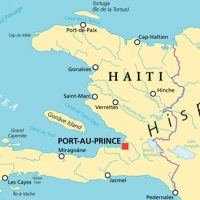
 iStock/Thinkstock(WASHINGTON) — Documents released Tuesday appear to show a contradiction between an internal agency report and the assessment by the director of U.S. Citizenship and Immigration Services (USCIS) about the end a humanitarian program, known as Temporary Protected Status (TPS), for Haiti.
iStock/Thinkstock(WASHINGTON) — Documents released Tuesday appear to show a contradiction between an internal agency report and the assessment by the director of U.S. Citizenship and Immigration Services (USCIS) about the end a humanitarian program, known as Temporary Protected Status (TPS), for Haiti.
USCIS Director Francis Cissna based his assessment and recommendation on the report, according to a letter.
The internal USCIS report said that “many of the conditions prompting the original January 2010 TPS designation persist, and the country remains vulnerable to external shocks and internal fragility.”
The memo went on to conclude that “due to the conditions outlined in this report, Haiti’s recovery from the 2010 earthquake could be characterized as falling into what one non-governmental organization recently described as ‘the country’s tragic pattern of one step forward, two steps back.'”
Cissna wrote to then-acting Department of Homeland Security Secretary Elaine Duke — who was responsible for making the final decision on the program — that while lingering effects of the 2010 earthquake remain, “Haiti has made significant progress in addressing issues specific to the earthquake.”
“In summary, Haiti has made significant progress in recovering from the 2010 earthquake, and no longer continues to meet the conditions for designation,” he wrote.
His final recommendation to Duke is redacted.
According to USCIS, the TPS memo addressed conditions related to the earthquake, including displaced people and a prior housing shortage.
The documents were released after the National Immigration Project of the National Lawyers Guild, along with the NYU School of Law, filed a lawsuit seeking records pertaining to the termination of TPS for Haiti.
In November, Duke announced her decision to terminate the program for Haiti, with a delayed effective date “to allow for an orderly transition before the designation terminates on July 22, 2019.”
In her announcement, she wrote that the “extraordinary but temporary conditions caused by the 2010 earthquake no longer exist.”
Approximately 59,000 Haitians have been impacted by the decision, and will have to leave the United States or face living in the country illegally — pending any legislative response or ongoing litigation.
Last Friday was Duke’s last day at the department, and she could not be reached for comment.
“I think it raises questions about whether they were making policy decisions about how they were approaching TPS, instead of case-by-case review that they have historically done,” Sejal Zota, legal director of the National Immigration Project of the National Lawyers Guild, said to ABC News.
“Their own internal report documents and confirms that many of the conditions persist and that the country remains vulnerable,” said Zota.
The termination of TPS for Haiti comes amid the end to numerous similar programs, like those for Nicaragua, El Salvador and Sudan, which immigration advocates say “creates instability and problems not just for these families, but for their communities.”
A decision on whether to extend TPS for Nepal is due next week.
This is the first batch of documents, but thousands more are expected over the coming months.
In response to the released documents, USCIS said that “the decision to terminate TPS for Haiti was made after an interagency review process that considered country conditions and the ability of the country to receive returning citizens, according to the agency.”
“DHS undertook an extensive outreach campaign to U.S. state and federal government officials, Haitian officials, and third-party partners who offered their input as to the conditions on the ground in Haiti. Based on all available information, acting Secretary Elaine Duke determined that the extraordinary and temporary conditions that formed the basis of Haiti’s TPS designation as a result of the 2010 earthquake no longer exist, and thus, pursuant to statute, DHS concluded the current TPS designation for Haiti should not be extended,” said Cissna in a statement.
The Lawyers Guild has also filed a separate lawsuit challenging the end to the program. The government is expected to provide a response to that lawsuit by May 24.
Copyright © 2018, ABC Radio. All rights reserved.















